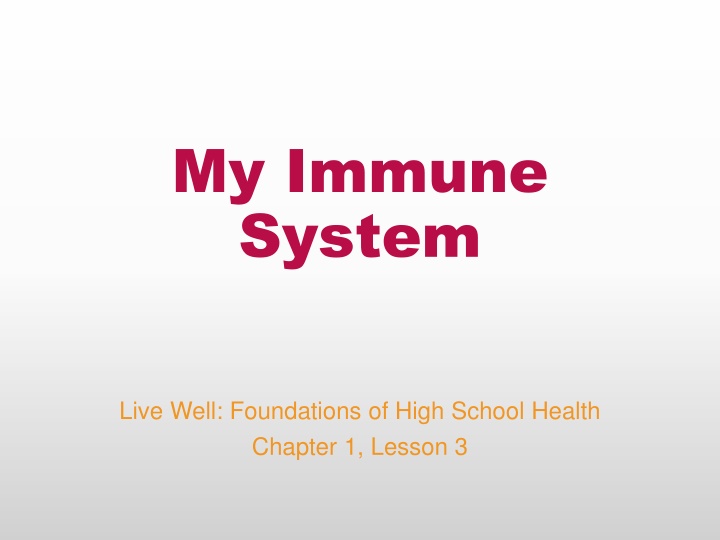
Your Immune System and How to Keep It Healthy
Learn about the immune system, the types of pathogens that can affect it, and how to maintain a healthy immune system through proper nutrition, exercise, and rest. Discover tips on how to support your body's natural defense mechanisms and stay well.
Download Presentation

Please find below an Image/Link to download the presentation.
The content on the website is provided AS IS for your information and personal use only. It may not be sold, licensed, or shared on other websites without obtaining consent from the author. If you encounter any issues during the download, it is possible that the publisher has removed the file from their server.
You are allowed to download the files provided on this website for personal or commercial use, subject to the condition that they are used lawfully. All files are the property of their respective owners.
The content on the website is provided AS IS for your information and personal use only. It may not be sold, licensed, or shared on other websites without obtaining consent from the author.
E N D
Presentation Transcript
My Immune System Live Well: Foundations of High School Health Chapter 1, Lesson 3
Write About It When was the last time you were really sick? What type of illness did you have? What factors might have affected your body s ability to fight off your illness? What did you do to try to feel better and to get healthy again?
Can you . . . (1 of 2) Identify the major organs and tissues of the immune system and explain their primary functions? Explain what a pathogen is and provide two examples? Explain how the immune system responds to pathogens? Describe four different problems the immune system could have? (continued)
Can you . . . (2 of 2) Explain how HIV affects your immune system? Explain how vaccinations work to help your immune system fight off known pathogens? Access and analyze the validity of information about immune disorders?
Types of Pathogens (1 of 2) Anything foreign that enters your body and can cause disease is called a pathogen. The two most common examples of pathogens are viruses and bacteria. Viruses are very small bundles of infectious materials that get inside your cells and then multiply. Bacteria are single-celled organisms found in the environment that can carry disease. (continued)
Keeping Your Immune System Healthy Eat foods rich in vitamins and minerals, such as fruits and vegetables. Get at least 30 minutes of exercise most days. Get 8 to 10 hours of sleep every night. Wash your hands regularly. Keep up with your vaccinations. Maintain a healthy weight. Don t drink alcohol, smoke, or vape. Manage stress with relaxation and exercise.
Influences on Your Immune System
HIV and AIDS HIV, or Human Immunodeficiency Virus, is a virus that attacks the immune system. AIDS, or Acquired Immunodeficiency Syndrome, is a medical condition that can result from HIV. It makes the immune system too weak to fight off infections and cancers. AIDS is the sixth leading cause of death among young people ages 25 to 44.
Problems With the Immune System Your immune system can experience health problems of its own. Immune deficiency disorders, such as HIV The immune system is weak. Autoimmune disorders, such as rheumatoid arthritis The immune system attacks parts of the body. Allergies The body becomes hypersensitive to allergens in the environment, causing a damaging immune response. Cancers of the immune system (lymphoma) The immune system develops cancerous cells.
Skill-Building Challenge Research one of the diseases in this lesson. Look for reliable websites with information about the immune system and diseases that affect it. The National Institutes of Health and Centers for Disease Control and Prevention can provide basic information on immune disorders. Search for key terms such as immune disorders, autoimmune disorders, and allergies.
